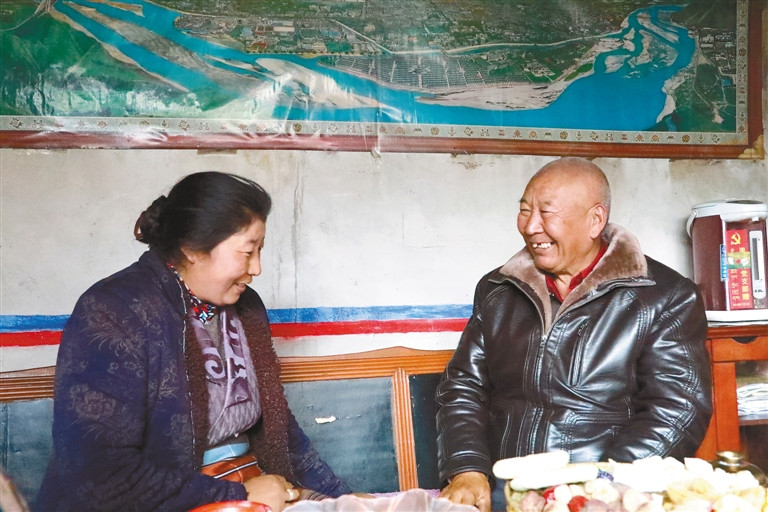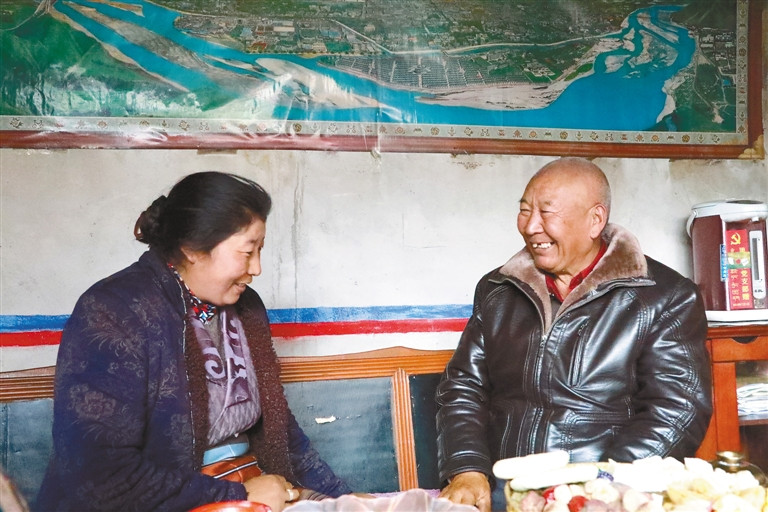Samdrup: from a shepherd to a wealthy “lead sheep”

Samdrup (right) and his daughter, Tsering Choedron, are talking about changes in their hometown.
Samdrup, born in 1945, currently 74 years old and living in Nelung Village, Boidoi Township, Sangri County, Lhoka City, southwest China's Tibet Autonomous Region. Before Tibet’s democratic reform in 1959, Samdrup’s parents and an elder sister died of disease one after another. Another sister was sold as a serf, and Samdrup himself became a serf for Nelung Monastery. After the democratic reform, Samdrup entered school and learned Tibetan and arithmetic, later becoming a township cadre through his own efforts. Today, he receives a retirement pension of 3,100 yuan (462 US dollars) per month, and his four children already have their own families and careers. Some of his grandchildren are in university and some are in middle school. All lead happy lives.
Speaking of old Tibet, Samdrup can’t help pouring out all his bitterness. When he was four years old, his parents became very sick due to many years of hard physical labor, and passed away later. Not long after, one of his elder sisters also became sick and died. Then, the steward of Nelung Monastery sold another of Samdrup’s sisters to an Estate as a serf.
Without anyone to depend on, young Samdrup could only go around begging for food. Fortunately, a serf named Garyul took him in. However, when Samdrup was eight years old, the steward of Nelung Monastery forcibly brought him back and made him a household slave. He had to graze herds every day.
“At that time, the three of us had to herd more than 300 sheep, ten or twenty yaks, horses, and mules,” Samdrup said. “The other two were both adults, only I was a child. Because I was young, I wasn’t good at looking after the cattle and sheep, so I was beaten often.”
Once when he was out grazing, a lamb was taken away by a hawk, and the manager beat Samdrup with whip until he couldn’t walk. The next day, he still had to graze, enduring his pain.
In old Tibet, “there were many kinds of penalties. Back then Nelung Monastery had seven or eight kinds of punishment tools, such as leg shackles,” Samdrup said.
Samdrup said that at that time, his daily food ration included only a little bit of tsampa, nothing else.
Just as Samdrup thought he was going to starve to death, Tibet began its vigorous democratic reform.
After the democratic reform, Samdrup entered school, studying Tibetan and arithmetic. His study days were a wonderful time in Samdrup’s life. Samdrup said, “You must know that in old Tibet, reading was a privilege of the nobility. The children of slaves could not even dream about reading books.”
In 1984, Samdrup opened the first shop in Nelung Village. “Seeing that I had earned my first income, the villagers at first were doubtful or envious, then later they became eager to try it,” Samdrup said.
Now, Samdrup receives a retirement pension of 3,100 yuan (462 US dollars) per month, and he has no worries. But what is most gratifying for him is that his children have already established families and careers of their own. Some of his grandchildren are in university, and some are currently in middle school.
Tibet Stories

Samdrup: from a shepherd to a wealthy “lead sheep”
Speaking of old Tibet, Samdrup can’t help pouring out all his bitterness.
Editor’s Choice
- Tibet's cultural industry sees sound development
- 11th Panchen Lama: abolition of serfdom engraved in the minds of the people
- Eco-friendly toilet to be set up at 7,028m on Mt. Qomolangma
- Tibet establishes HIV/AIDS prevention, treatment association
- Panchen Lama: democratic reform an important turning point for Tibetan Buddhism

